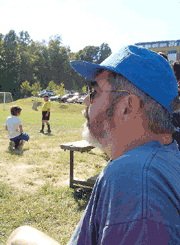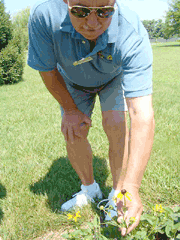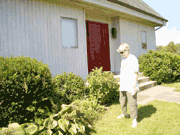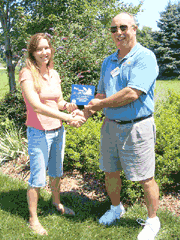|
|||||
Is Your Garden Bay Wise?How my dad and I measured by the Bay Wise Maryland yardstickby Alexandra BrozenaWar has my father in Afghanistan, surveying for oil exploration. So home from college (in New Orleans, but that’s another story) I’ve filled for him in his beloved garden. Over a dozen years, I’ve been his labor. Now I want to do something special for his yard while he’s away. So I’ve invited a pair of University of Maryland Cooperative Extension Master Gardeners over to educate me and to judge our garden on Bay friendliness.
I suspected, with more than a little pride, that our hard work had resulted in a Bay Wise lawn. Still, I felt nervous, as if the yard and I were taking a test — and because, knowing how much my father loves his grass and trees, I wanted his yard to be approved so I could remind him of his green lawn while he lives in the desert. Gardeners Who Make House CallsThese Master Gardeners I’ve called on have earned their title. To join their county’s branch of the statewide program, each Master Gardener completes a set of courses, takes a written test and completes 40 hours of volunteer work. Bay Wise is one of Anne Arundel County Master Gardeners’ 21 programs to educate and help citizens be better stewards of the Earth. In the popular Bay Wise program, two volunteer Master Gardeners visit your garden to inspect and advise you on how to make your garden more ecological and Bay friendly. Bay Wise and all the other programs and services are free and year-round. The Master Gardeners will even come certify your yard as Bay Wise on the weekend if your work schedule is too busy during the week. “Our goal is to go out to as many homeowners as we can each season and teach them about being Bay Wise conscious so they don’t pollute the Bay,” explained Master Gardener Bob Bates. “If they are doing enough good things, we certify their yard as being Bay Wise friendly. We present them with a sign and a certificate for their yard.” The University of Maryland Cooperative Extension, an agricultural outreach to citizens, developed a list of criteria that they call a Bay Wise Yardstick to see how a homeowner’s garden measures up in terms of environmental friendliness. The Master Gardeners use this long list of landscaping and eco-related questions and award points for each positive answer. How Does Our Garden Grow? Outdoors, where it felt like the inside of a dog’s mouth, Master Gardener Bob Bates, a retired Navy engineer, greeted me with a strong grip suitable to his former career. Judy Graham, his partner in this expedition, was already inspecting our landscape. She extracted herself from the untrimmed bushes with a smile and a greeting. The first step of a Master Gardener evaluation is a survey. In a short promenade around the yard, Bates or Graham asked about my family’s typical gardening practices. “Do you take care of your lawn yourself, or do you have a lawn service?” Bates asked. “We do our lawn,” I answered. “My dad takes pride in his grass and does it himself, enlisting his children to help,” I added, unable to contain my little brag on my hard work. Explanation and education followed each question I answered. I thought I knew a few tricks about gardening from listening to my parents, but these Master Gardeners, I realized, garner their title for good reason. “Mowing high keeps the weeds from being germinated, since the sun doesn’t reach them,” said Graham helpfully, proving that there are more eco-friendly ways to discourage weeds than spraying harmful herbicides. Graham and Bates also explained the importance of fertilizing only in the fall, a chore I knew my father would be at as soon as he got home. We Don’t …As we continued our sweaty walk around the garden, I felt myself puffing up with each approving remark about our lawn. Then Graham stopped on the house’s northern side. She rested her hands on her hips and peered into the landscaped foliage that had run a little wild since my father went away. Bates joined her over a collection of large, wilted hostas. “They’re looking a little stressed,” he said. I could only sputter a weak defense. I hadn’t noticed before, but the hostas did look abused, brown and crinkly around the edges. I had helped plant them a decade earlier, as a 10-year-old who hated gardening with a passion that lead to a temper-tantrum whenever we broke out the hoes. Every spring and fall, my father would force my mother, brother and me to join him in the dirt. We dug up sod and spread mulch. My brother and I excavated nearly every hole for each tree in the yard while my father supervised. He wanted us to love gardening as much as he did, and this was his way of teaching us the pleasures of tending a yard. Still, I boiled with anger when I was torn from the TV and made to plant those hostas. Graham and Bates remained as pleasant as ever, as I blushed for hosta-neglect. Pride momentarily subdued, I remembered my place as the garden’s laborer and led the true masters inside. Surely, a few near-dead hostas didn’t qualify my family’s yard as Bay unfriendly. But the real test was yet to begin. Measuring UpSeated comfortably and coolly around the kitchen table, the Master Gardeners got out their Bay Wise Maryland Yardstick and smoothed it onto the table. “You have to get over 36 points to qualify,” said Graham.
Suddenly, I was not so positive our yard would pass. Thirty-six positive eco-points about our land seemed like a lot. With my father absent, I was left to advocate the garden he had tended so carefully. “About how many people a year do you certify?” I asked. “We certified 13 yards this year, and there’s five or six yards that were not certified,” Bates said. I hoped my yard wouldn’t be the seventh. Roughly 50 questions seemed like a lot, but I strengthened my resolve, remembering the handsome blue sign I had seen a few weeks previous outside a bed and breakfast on Solomons Island. The sign had read Bay Wise; Landscape practices for a healthy Chesapeake Bay and featured the classic silhouette of a blue heron in marsh grasses. The B&B had undergone the same test and was rewarded with this small, dignified sign of achievement. I am rarely competitive, and I have few trophies to show, but I wanted that sign to display in my father’s garden. “Have you ever gotten your soil tested?” Bates asked, beginning the Yardstick exam. “I don’t think we have,” I said, already disappointed with this poor start. Our yard passed the next six questions, and I felt more optimistic again. “Japanese beetle traps?” Bates asked. “Don’t have those,” I answered. “Good,” he said, checking off one more box. As we ground our way through each question, I realized my father’s seemingly eccentric gardening practices were more intelligent than strange. He planted his deciduous trees on the south side of the house, and the evergreens resided on the north. According to the Master Gardeners, that brought us one point closer to certification and my goal. Speaking for my father, I gained even more respect for his outdoor work. It had only taken 10 years for me to accept that his obsessive yard care was simply good, eco-conscious gardening. The test took nearly an hour. More than once, I was tempted to answer positively on a question that in truth our yard would fail. But I stuck to the facts. “Thirty-nine and three-quarters. You have enough,” Bates said. We had passed, and I was relieved. While Bates brought in the Bay Wise sign our yard had achieved, Graham and I talked about how yard care affects the Chesapeake. “People just need to be informed,” said Graham, who holds that if every yard in Maryland were environmentally tended, then Bay water quality would improve. The challenge is educating us citizens about how seemingly benign practices of yard work actually hurt the Bay. Bates and I posed for pictures as he presented me with the sign, which was just as grand looking as I remembered. I emailed my father the good news. He was pleased. But true to his self — even thousands of miles away from the garden — what he really wanted to know was whether I thought there would still be tomatoes growing when he got home. He was pining for a tomato sandwich. Learn more about Bay Wise gardening and earn its reward at http://www.baywise.umd.edu/bwprogram.cfm. Alexandra Brozena, of Davidsonville, has returned to Tulane University, where she studies English and environmental science — but not before her father returned from Afghanistan to his Bay Wise family, garden and fresh tomatoes. This is Brozena’s third story for Bay Weekly, following “Child’s Play: The First Annual Kids’ Playwriting Festival highlights North Beast Bayfest” (Vol. xiv, No. 34: Aug. 24). |
|||||
|
|
|||||
|
© COPYRIGHT 2004 by New Bay Enterprises, Inc. All rights reserved. |






